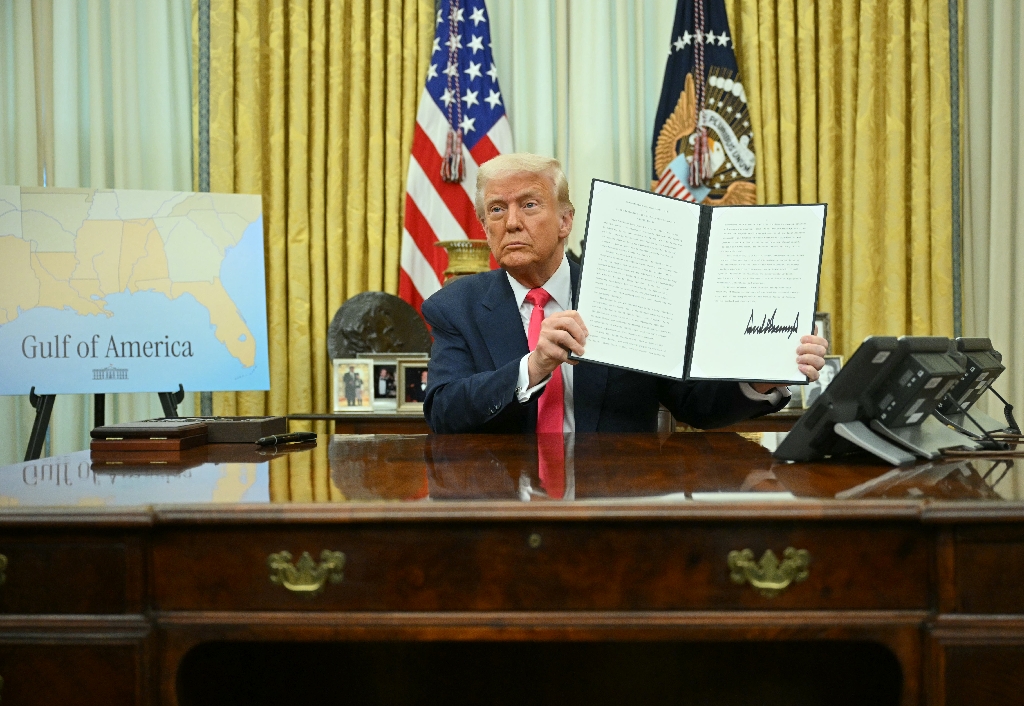(AFP) – An international effort gathered pace on Friday to get desperately needed humanitarian relief into Gaza by sea, in the latest bid to counter overland access restrictions blamed on Israel as it battles Hamas militants.
In the Cypriot port of Larnaca, European Commission chief Ursula von der Leyen expressed hope a maritime corridor could open this Sunday, though crucial details of the planned operation remained unclear.
She said “an initial pilot operation” would be launched on Friday, and the United Arab Emirates had helped activate the corridor “by securing the first of many shipments of goods to the people of Gaza”.
Her announcement came after US President Joe Biden, in his annual State of the Union address on Thursday, said the US military would establish a “temporary pier” off Gaza’s coast to bring in aid.
The United Nations has repeatedly warned of looming famine in the long-blockaded Gaza Strip, which has been under Israeli siege since the Hamas attack of October 7 triggered the war, now in its sixth month.
With relatively few aid trucks entering by land and convoys headed to Gaza’s north often blocked or looted, several countries including Israel’s top ally the United States have been parachuting food and other assistance.
But air or sea delivery is not the best way, and the “diversification of the supply routes via land” remains the optimal solution, said Sigrid Kaag, the United Nations aid coordinator for Gaza.
Biden, whose administration has been increasingly vocal about the war’s consequences for civilians, delivered some of his strongest comments yet, as hopes dimmed for a new truce before Ramadan, the Muslim fasting month which could begin Sunday depending on the lunar calendar.
“To the leadership of Israel I say this — humanitarian assistance cannot be a secondary consideration or a bargaining chip,” Biden said.
– ‘Humanitarian tragedy’ –
Hamas’s unprecedented October attack on southern Israel resulted in about 1,160 deaths, most of them civilians, according to Israeli official figures.
Israel has responded with a relentless offensive that the health ministry in Hamas-run Gaza said has killed at least 30,878 people, mostly women and children.
Hamas militants took about 250 hostages, some of whom were released during a week-long truce in November. Israel believes 99 hostages remain alive in Gaza and that 31 have died.
US officials said the effort announced by Biden builds upon the maritime aid corridor proposed by Cyprus — the closest European Union member to Gaza.
Speaking alongside the EU’s von der Leyen, Cypriot President Nikos Christodoulides said: “We have a responsibility to act. What is unfolding before our eyes is a humanitarian tragedy.”
The maritime corridor “aims at scaling up aid by complementing other routes”, he added.
The Jordanian military announced that it had airdropped more aid into northern Gaza on Friday in an operation also involving planes from Belgium, Egypt, France, the Netherlands and the United States.
A US administration official, speaking on condition of anonymity to brief reporters ahead of Biden’s speech, said a “number of weeks” would be required before aid deliveries to the planned pier could begin.
“But we’re not waiting on the Israelis,” the official said.
Israel, which withdrew from Gaza in 2005 but has maintained control over its airspace and territorial waters, said it “welcomes” the planned maritime corridor.
“The Cypriot initiative will allow the increase of humanitarian aid to the Gaza Strip, after a security check according to Israeli standards,” foreign ministry spokesman Lior Haiat said.
Israeli troops took “operational control” of Gaza port in November, the army said at the time. The harbour was damaged in the fighting.
With no functioning ports in the territory, officials did not say where initial shipments would go, whether they would be subject to inspection by Israel or who would be tasked with distributing aid to civilians.
The Biden administration official said Israel has agreed to open a new land crossing that would “allow for aid to flow directly to the population in northern Gaza”, starting “over the coming week”.
– Aid ‘could just be let in’ –
British foreign minister David Cameron said “we need 500 trucks a day or more going into Gaza”, but the past five days have averaged just 123.
“That needs to be fixed now,” he told BBC radio, also calling on Israel to ensure the “full resumption” of water and electricity supplies.
The United Nations has said “access constraints” are limiting the provision of drinking water and other essential services.
The situation is particularly acute in north Gaza, where residents have survived on animal fodder.
Desperate Gazans have swarmed the aid trucks which do make it in to the territory.
On February 29, more than 100 Palestinians were killed when Israeli forces opened fire on crowds scrambling for food aid from a convoy in north Gaza, according to the health ministry.
The Israeli army said Friday that its initial investigation found troops “fired precisely” at suspects who posed a threat to them.
Manal Draymali, 44, a Palestinian woman displaced to Rafah, said that with firewood scarce, “we scavenge for plastic and other discarded items” to cook.
Roughly 1.5 million Palestinians have sought refuge in Rafah, in Gaza’s far south, but there, too, they are not safe.
At the city’s Al-Najjar hospital, a man held the body of a child killed in a bombardment, shrouded in a white cloth soaked through with blood. Biden had urged Hamas to accept a truce before Ramadan, but its negotiators have left talks in Egypt to consult with the movement’s leadership in Qatar.
The delegation voiced dissatisfaction with Israeli positions so far, while Israeli war cabinet member Gadi Eisenkot said Hamas was under “very serious pressure” from mediators to make a “counter-offer”.
US ambassador to Israel Jack Lew denied the talks had “broken down”. – Adel Zaanoun with Ilan Ben Zion in Jerusalem
© 2024 AFP




